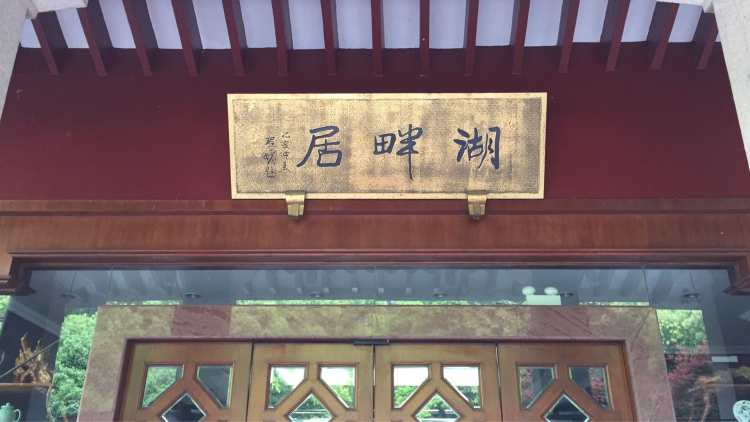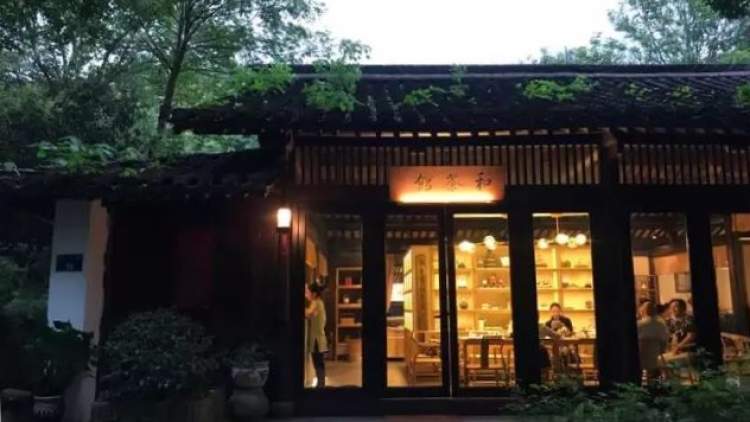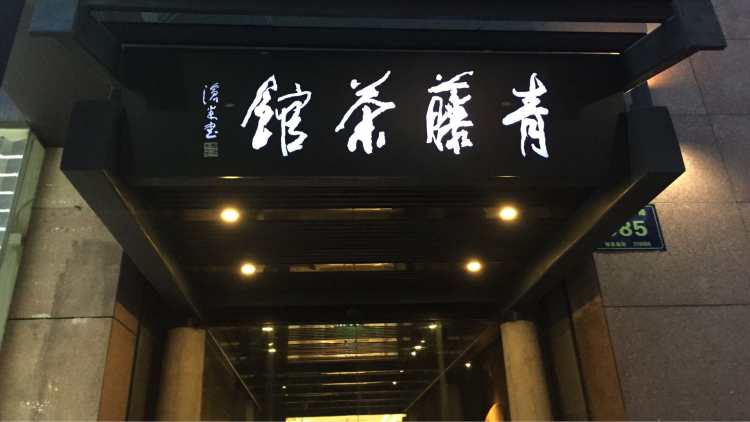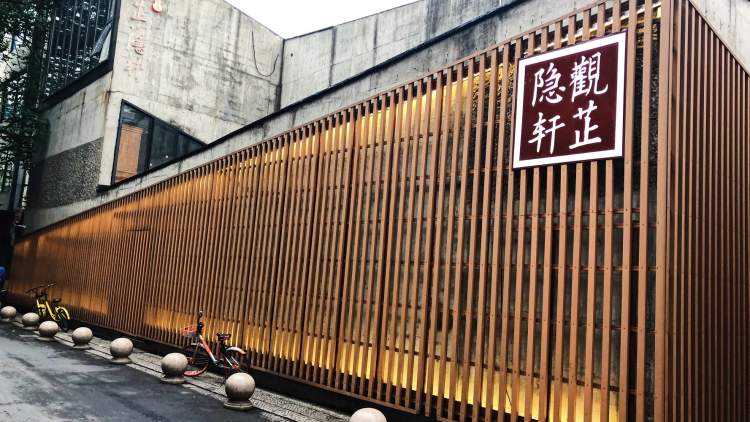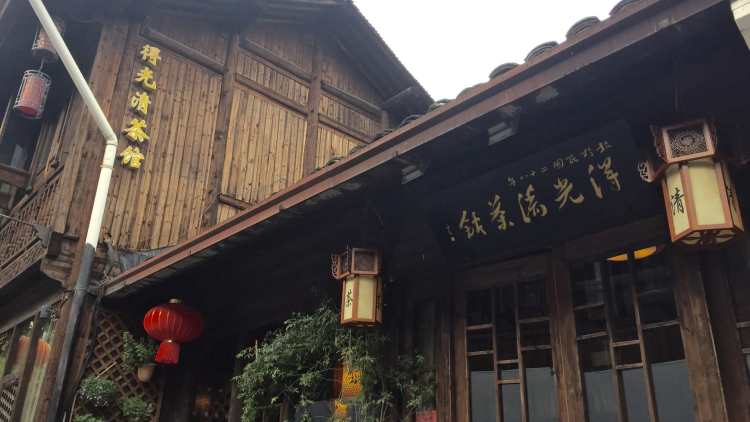As a famous tea capital, Hangzhou is famous for the West Lake Longjing. In Hangzhou, drinking tea is a common daily pastime, regardless of men and women, young and old, who understand tea or not, always like to spend tea in the teahouse. According to statistics, there are currently as many as 2,000 teahouses in Hangzhou, mainly providing tea tasting services, and occupy a large proportion of the catering market in Hangzhou.
Whether locals or tourists, when it comes to Hangzhou teahouses, they will first think of the famous lakeside teahouse. Located on the north side of the Six Parks, the first store in the lake has the reputation of "famous teahouse in the south of the Yangtze River" and "Laoshe teahouse in the north, and lakeside teahouse in the south". As a representative of Hangzhou's old teahouse, Lakeside House is not only a popular teahouse with both popularity and reputation, but also the first choice for many celebrities and politicians to taste tea in Hangzhou, and has been used as the reception venue of the Hangzhou G20 Summit, known as the "West Lake Meeting Room".
The tea in Lakeside Residence is charged per person, and the price of different types of tea is between 220 and 360 yuan. West Lake Longjing is naturally the signboard of lakeside residence. As the top ten famous teas in China, according to the relevant regulations on the protection of geographical indication products, only Longjing tea that is planted, picked and processed in the West Lake Scenic Area and the 168 square kilometers around the West Lake District can be called "West Lake Longjing Tea". That is, it is mainly Shifeng, Longjing, Wuyun Mountain, and Hupao area, among which it is generally believed that the Longjing produced in Shifeng is of the best quality. The lakeside dwells in Shifeng and has its own tea mountain, and the West Lake Longjing tea in the store is harvested from the Shifeng production area.
According to the different harvesting time, the Longjing tea harvested before the Qingming Festival is called "Mingqian tea", and the tea harvested before the rain in the valley is called "pre-rain tea". As for Longjing tea, it is known as the saying that "before the rain is the best quality, before the Ming is a treasure", so many high-quality tea houses in Hangzhou mostly follow the best picking season, focusing on Longjing before the Ming Dynasty, and the lakeside residence is no exception. After the Ming Dynasty Longjing of the lakeside residence is picked, the tea master A Mao, who has been on the CCTV channel, roasts the tea by hand, and the Longjing made by hand with a series of such as "fried green" exudes a mellow fragrance, not bitter or astringent, and the mellow fragrance of the tea leaves is released in the hands of experienced masters.
The water used to brew tea is also an important part of the quality of tea, and the water that meets the requirements of "clear, light, sweet, cold and lively" can be called good water. The brewing water selected by the lakeside residence is the fourth spring in China - Hupao Spring Spring Water, which is located in the side courtyard of Huichan Temple (commonly known as Hupao Temple) under the White Crane Peak of Daci Mountain in the southwest of Hangzhou, and is the groundwater seeping up from the cracks in the rocks. Relevant data show that there are fewer soluble minerals in Hupao Spring and low total hardness, which is in line with the quality of high-quality brewing water. The tea brewed with Hupao spring water is gentle on the mouth, adding to the deliciousness of the tea.
The West Lake Longjing in the store is divided into three grades: high-quality first-class, high-quality second-class, and ordinary, and the tea seedlings are standard one bud and two leaves. Among them, the first-class Longjing buds and leaves are the most delicate, and the cords are flat and beautiful, smooth and even. With the decline of the grade, the tea body from small to large, the tea surface from smooth to rough, and the color from tender green to dark green. The store uses glass cups to brew green tea such as West Lake Longjing, and the tea master brews the first brew in the inner hall and then presents it to the table, and then the tea customers refill the water by themselves. After brewing, the soup color of the first-class Longjing is tender and green, the entrance is sweet and mellow, and the bottom of the leaves can be observed from the glass is delicate and tender, neat and even, and the buds and leaves after brewing are fat and fruitful, which is really a good product. Because it is a tea before the Ming Dynasty, the soup base is gradually cleared after about three bubbles, and the mellow taste becomes lighter. The ordinary grade of Longjing bud leaves is slightly mutilated, with a little leaf stalk pedicle, which is no different from the quality of ordinary teahouses, and the price is on the high side.
If you choose one or two teas for two teas in Lakeside Residence, you can exchange two types of tea for free. In addition to West Lake Longjing, there are nine types of green tea, such as Anji white tea, Taiping Houkui, and Tian'an melon slices. There are classic famous teas such as Jin Jun Mei, Taiwan Red Jade, Taiwan Alpine Black Tea, Zhengshan Xiaozhong, and Jiuqu Red Plum. Among them, Jiuqu red plum is one of the historical famous teas in West Lake District, which was moved north from the farmers of Jiuqu in Wuyi Mountain, Fujian Province to the area of Dawu Mountain in Hangzhou, and because the tea soup is red like red plum, it is called Jiuqu red plum. The Jiuqu red plum of the lakeside residence is brewed with a white porcelain tea set, and the soup is red and bright, but the taste is slightly thin and lacks a trace of mellow aroma. In addition, a full range of classic oolong teas, black teas, white teas, yellow teas and homemade flower teas are also available.
There is a wide variety of refreshments at the lakeside house. Each table is equipped with six types of refreshments, three tea boxes, and four types of seasonal fruits, all of which can be refilled. Among them, lakeside tea fragrant eggs, Dingsheng cake, lotus cake, and purple potato cake are the most popular. It is worth mentioning that the refreshments of the Lakeside Tea House have appeared on CCTV's "A Bite of China 3" program, and the column team selected and photographed the four kinds of dim sum of the Lakeside Residence: Lotus Root Powder, Lakeside Green Onion Bun Junier, Lotus Crisp and Longjing Tea Crisp. West Lake lotus root flour is one of the famous products in Hangzhou, Zhejiang Province, the occasional lotus root flour in the lakeside residence is crystal clear and transparent after brewing, the taste is mellow, and the osmanthus is decorated with more fragrance. The lotus crisp made of puff pastry is shaped like a lotus flower, with a clear crisp layer, crispy pine and sweet in the mouth, and has a unique flavor. Longjing tea crisp has the fresh orchid fragrance of West Lake Longjing, the skin is crispy, the entrance is delicate, and it is decorated with "one bud and two leaves", and the entrance is quiet and fragrant. Now these four refreshments have also become the star refreshments of Lakeside Residence.
Lakeside Tea House has four stores in Hangzhou, of which the Lakeside Main Store is located on the north side of the Six Parks along the West Lake, and is the only three-storey single-family building on the edge of the West Lake, with two-thirds of the buildings on the water. The indoor lobby on the first floor is adjacent to the lake, and the view is excellent even though it is on the ground floor. The second and third floors are outdoor terraces, with a panoramic view of the West Lake, and the tea table fee in the terrace area on the third floor is the highest. Each floor is equipped with an indoor box, which needs to be booked in advance, and the price ranges from 1800-9600 yuan. The quality of tea service also reflects the grade of the tea house, and there are five national tea technicians living by the lake, who usually make tea in the box where VIPs are received. Most of the tea masters in the hall are young women, dressed in simple clothes, and have basic tea knowledge, and will recommend suitable tea products for tea customers. The tea house changes the tea in time, but the pastry is served slowly, and the tea customers need to wait patiently.



